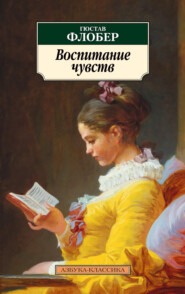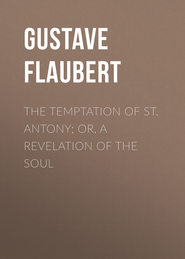По всем вопросам обращайтесь на: info@litportal.ru
(©) 2003-2024.
✖
Sentimental Education; Or, The History of a Young Man. Volume 2
Настройки чтения
Размер шрифта
Высота строк
Поля
"It is always with a new pleasure… Polish nationality will not perish… Our great works will be pursued… Give me some money for my little family…"
They all laughed hugely, declaring that he was a delightful fellow, full of wit. Their delight was redoubled at the sight of the bowl of punch which was brought in by the keeper of a café.
The flames of the alcohol and those of the wax-candles soon heated the apartment, and the light from the garret, passing across the courtyard, illuminated the side of an opposite roof with the flue of a chimney, whose black outlines could be traced through the darkness of night. They talked in very loud tones all at the same time. They had taken off their coats; they gave blows to the furniture; they touched glasses.
Hussonnet exclaimed:
"Send up some great ladies, in order that this may be more Tour de Nesles, have more local colouring, and be more Rembrandtesque, gadzooks!"
And the apothecary, who kept stirring about the punch indefinitely, began to sing with expanded chest:
"I've two big oxen in my stable,
Two big white oxen – "
Sénécal laid his hand on the apothecary's mouth; he did not like disorderly conduct; and the lodgers pressed their faces against the window-panes, surprised at the unwonted uproar that was taking place in Dussardier's room.
The honest fellow was happy, and said that this recalled to his mind their little parties on the Quai Napoléon in days gone by; however, they missed many who used to be present at these reunions, "Pellerin, for instance."
"We can do without him," observed Frederick.
And Deslauriers enquired about Martinon.
"What has become of that interesting gentleman?"
Frederick, immediately giving vent to the ill-will which he bore to Martinon, attacked his mental capacity, his character, his false elegance, his entire personality. He was a perfect specimen of an upstart peasant! The new aristocracy, the mercantile class, was not as good as the old – the nobility. He maintained this, and the democrats expressed their approval, as if he were a member of the one class, and they were in the habit of visiting the other. They were charmed with him. The apothecary compared him to M. d'Alton Shée, who, though a peer of France, defended the cause of the people.
The time had come for taking their departure. They all separated with great handshakings. Dussardier, in a spirit of affectionate solicitude, saw Frederick and Deslauriers home. As soon as they were in the street, the advocate assumed a thoughtful air, and, after a moment's silence:
"You have a great grudge, then, against Pellerin?"
Frederick did not hide his rancour.
The painter, in the meantime, had withdrawn the notorious picture from the show-window. A person should not let himself be put out by trifles. What was the good of making an enemy for himself?
"He has given way to a burst of ill-temper, excusable in a man who hasn't a sou. You, of course, can't understand that!"
And, when Deslauriers had gone up to his own apartments, the shopman did not part with Frederick. He even urged his friend to buy the portrait. In fact, Pellerin, abandoning the hope of being able to intimidate him, had got round them so that they might use their influence to obtain the thing for him.
Deslauriers spoke about it again, and pressed him on the point, urging that the artist's claims were reasonable.
"I am sure that for a sum of, perhaps, five hundred francs – "
"Oh, give it to him! Wait! here it is!" said Frederick.
The picture was brought the same evening. It appeared to him a still more atrocious daub than when he had seen it first. The half-tints and the shades were darkened under the excessive retouchings, and they seemed obscured when brought into relation with the lights, which, having remained very brilliant here and there, destroyed the harmony of the entire picture.

















